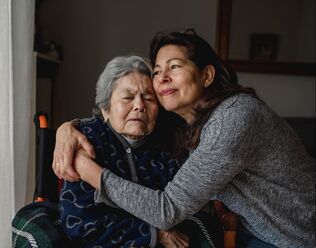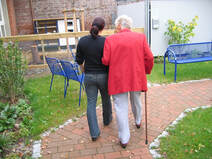My loved one was recently diagnosed with dementia. How can I help them in the early stages?1/21/2023 By: Nicole Ruggiano, PhD, MSW It is never easy for someone to receive a diagnosis of Alzheimer's disease or other type of dementia. In fact, research has shown that older adults are more afraid about dementia than they are afraid of cancer. It is normal for those who are diagnosed with dementia to experience a number of emotions, including fear about the future, anger, depression and denial. If your loved one has recently been diagnosed with a form of dementia and is having a hard time coping with their diagnosis, there are things that family and friends can do to help them in these early stages of their condition.
9 Comments
By, Nicole Ruggiano, PhD, MSW Caregiving can be a time intensive activity, and caregiving needs can sometimes be unpredictable. That can pose a lot of challenges for caregivers, who are often also full-time workers and have other family responsibilities. Even though most caregivers are happy that they are able to care for their loved one, caregiving can still be exhausting. How often do you feel tired at the end of the day? You are not alone! According to a recent study by the National Alliance for Caregiving and AARP, among caregivers of older adults:
By, Nancy Kusmaul, PhD, MSW Caring for another person can be rewarding, challenging, and overwhelming . Many caregivers choose to care for family members and friends out of a sense of love, or paying someone back for care they have received earlier in life. But what happens when you can no longer provide that care? There are many reasons that you might not be able to continue caring at home. Family leave in the United States is limited, and you may not be able to take any more time off from work. Certain diagnoses, like dementia, can make it hard to provide care, especially if the person needs supervision around the clock for their own safety. Caregivers need to eat and sleep too, and it can be difficult to be “always on” to make sure that someone with dementia does not get hurt. And sometimes someone’s physical needs are just too much, and the caregiver cannot lift, or move, or provide care without great risk to both the caregiver and the person in need of care. If this sounds familiar, you have not failed. However, when we care for those we love, we also need to deal with their, and our, emotions and expectations. It is very common for loved ones to have asked to “never put me in a nursing home” or for family members to have promised not to do so. But sometimes that is just not possible. By, Bryan Ford, PhD, MSW Caring for another human being can be one of the most rewarding accomplishments of your life. It can also be very challenging and at times, overwhelming. It disrupts our lives, forces us to change our schedules and habits; just when we feel our lives are already busy enough. Yet, how you approach care planning can be just as important as what you do. Actively caring for another person has the potential to change your life in ways you never imagined. Caring for someone else is one of life's greatest teachers because you will learn much about yourself and those around you. Many caregivers put pressure on themselves to do everything "perfectly." This can often result in feelings of caregiver guilt. Don't feel that you have to be perfect, just do your best. The aim here is to improve the quality of you and your loved ones’ lives. If you are starting to develop a care plan, here are five areas that you should focus on: Health, Emotional, Legal, Portfolio (financial and insurance), and Social Issues (HELPS). These HELPS tasks are the gleaned from research to get you started. By, Nicole Ruggiano, PhD, MSW Caregiving is hard. It can be hard, physically and mentally. For many caregivers, this results in a mix of emotions from day to day. Even though it's challenging, caregivers often feel good about being able to provide care for their loved one. However, sometimes caregivers also feel guilty. Take Kim*, a 30-year old caregiver in in Birmingham, who talked about her experience with guilty feelings during an interview for one of our projects: Sometimes I feel like I’m not doing enough, but I don't know what else I can do. Then there’s the guilt. I think I have a lot of guilt about not recognizing more of my Dad's symptoms in the beginning. Even now, I think there’s a little bit of guilt that’s just surrounding the diagnosis itself. You’re watching somebody really decline. It could be two days, it could be another 10 years. By Nicole Ruggiano I often talk with people who have recently become caregivers and are not sure where to turn to for information. Oftentimes, they do not know what information to look for or where to find it. Also, the resources and services available in communities varies, so I'm often at a loss when a caregiver asks about services in a community that I'm not familiar with. Caregivers are desperate for information, though! There are so many questions they have, like:
|
Caregiving 101The Caregiving 101 is a resource for caregivers in Alabama who want to learn more about caregiving and dementia. Archives
August 2023
What would you like to learn more about?
All
|
205-348-4654

 RSS Feed
RSS Feed
